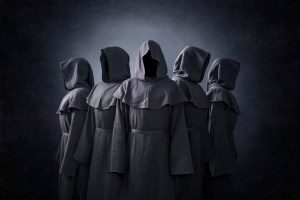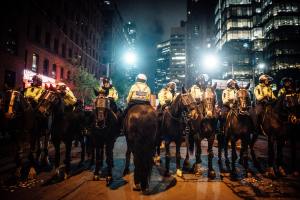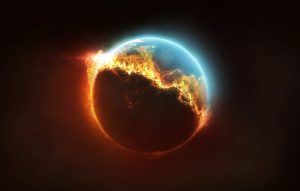Chances are, if you are creating a fictional world, you will need to explore this fictional society that you’ve created. And chances are, that society will have some…problems. Sometimes those problems escalate. And if they escalate enough, congratulations! You’ve got yourself a complete societal collapse.
I know this sort of topic hits a bit close to home lately, but regardless, it still makes for an interesting plot point in any fiction story.
The question is: what is causing that collapse?
Here are some interesting ways you can destroy your world, specifically ways that do not involve the usual resource scarcity and/or war angle.
Please note: some of the examples I mention aren’t necessarily about just complete destruction, but a rebuilding of society into something different. I count revolutions and changes in leadership as societal collapses, albeit in a less “this sucks, everything is over” kind of way and more of a, “society is fundamentally different now” kind of way.
Let’s begin.
1. Greedy Leadership
Okay, hear me out, friends. I know this one sounds very unrealistic, and it’s hard to imagine our benevolent leaders using their position of power for their own financial gain at the expense of their own constituents, but really, anything is possible. Right?
One could argue that greedy leadership counts as a form of scarcity, albeit a kind of artificial scarcity caused by the inaction of those in power. But I make an exception for it just because it really isn’t any kind of ‘scarcity’ at all.
Society isn’t wanting for vital resources or on the cusp of collapse because they’re dealing with a real shortage; it is wanting for those resources because a few people born into wealth and influence decided to use that leg up in life to grant themselves more privileges, even if it comes at the expense of the people they’re supposed to serve.
It seems so insanely outlandish—the greedy few sacrificing the many for themselves even when they don’t need to—and yet it isn’t outlandish at all, because it’s the world we live in.
This makes for a couple of opportunities in your writing: an easy-to-hate antagonist, a relatable dilemma, a speculative take on where our own society could end up in the very near future if nothing changes, and maybe even a chance to present solutions, albeit in a sci-fi/fantasy setting.
Examples:
- Fantasy: The nobility in a society that runs on magic has been hoarding all of the magic, hosting lavish parties and waging war on helpless neighbors, all while their own people starve in the streets. (Highly recommend reading Heather Walter’s Malice, which does something similar with Fae magic and the wealthy humans with access to it.)
- Fantasy: The gods who rule a fantasy world are more than capable of ending any and all famine, poverty, misery, and warfare. But if they do, mortals won’t need to pray for them anymore, and they want to be worshiped. So they sacrifice mortal lives to keep their temples full and their power ever-growing.
- Science Fiction: The council governing hundreds of planets throughout the galaxy has been hiding a secret: they have unlocked the key to immortality. Problem is, if everyone is immortal and all-powerful, they will be obsolete. So they keep the secret, because of course they do.
2. A Single Powerful Being Holding Everyone Prisoner
This is a bit of an odd one. If you’ve ever seen that one Twilight Zone episode, “It’s a Good Life,” where a kid has godlike reality-bending abilities and uses them to take over and enslave the small town he lives in, then you know what I’m talking about.
Something that makes horror so powerful as a genre is the idea of being helpless against someone or something hunting you down. This is especially true in slasher films, where the hapless teens are ruthlessly hunted down by a cold, soulless killer who seemingly can’t be stopped. Imagine someone able to hold, not just a few individuals hostage in this way, but an entire society. One entity that single-handedly collapses society as we know it and turns it into its own personal playground.
I’m also thinking of horror and dystopian stories like Harlan Ellison’s “I Have No Mouth and I Must Scream,” where a supercomputer gains sentience, wipes out all of mankind except five people, and proceeds to torture them for over a century. For a hundred years, these humans are given immortality only to be tormented for the pleasure of a spiteful AI. And there’s not a damn thing they can do about it.
Examples:
- Science Fiction: A group of scientists and/or the government try to play god by creating something: AI, a monster, a superhuman being, etc, etc. Things get out of hand really quickly when the creation realizes it doesn’t have to play by the rules of its creators.
- Fantasy: I played this game called Spellcaster University and I absolutely adored it, in part because the whole premise of the game is that you’re trying to build a magic school fast enough to stop the Dark Lord from destroying the world. If you can’t succeed in time, game over. Fortunately, through the power of magic, you can turn back time and try again. But that had me wondering: what happens if you can’t turn back time to reverse the apocalypse? So hey, maybe your world is dealing with some kind of dark lord/lady with a vendetta against living, and time is running out. It’s a pretty classic trope, but it’s also a possible way to end the world: what if the dark lord/lady succeeds? What happens next? Who survives and what becomes of them?
3. Disease
Another familiar one, I’m sure.
Pandemics are unfortunately inevitable in any society. Now, if your world has magic or insanely advanced technology, maybe this one doesn’t apply as much and it’s not so ‘inevitable’ after all. But for everyone else, chances are some kind of outbreak will occur with varying levels of contagion and fatalities. The deadliest virus, The Black Death, killed what is estimated to be as many as 100 million people at the lower end of the estimated scale, wiping out as much of half of the population of Europe.
If a disease spreads fast enough and is deadly enough, it has the potential to permanently alter how society is run by wiping out a significant percent of the population–if it doesn’t kill everyone outright. How the people of your society respond to the outbreak will also have an impact: will there be riots? Anti-vaxxers/anti-maskers? Will the government care enough to impose mandates? Is science advanced enough to develop a vaccine before it’s too late?
And of course, since your world is (presumably, if you’re reading this) speculative in nature, you could take it even further than just ‘a pandemic that kills people.’ Is it a zombie virus? Does it give people unstable powers or abilities? Does it end society, but not in the way we might expect? Maybe it instead irreversibly alters peoples’ behavior and how they want their society to run?
All of these things play a role in whether society ends entirely, or is transformed into something new. Or, hell, maybe the population manages to curb the illness before it even becomes an issue. But you wouldn’t be here looking for new ways to end the world if that were the case, would you?
Examples:
- Urban Fantasy: A disease spreading through a major city causes humans to mutate into creatures once only heard of in legend: vampires, werewolves, demons, gargoyles, zombies, and so on. Soon enough, most of the city is made up of monsters, with only a small population of humans remaining. How do people adjust? Do the monsters and humans live in relative harmony? Is the leadership made up of mostly monsters, or humans? Is everyday life any different? Can this city even sustain itself with such a drastic change? Do factions of different types of monsters split off to found their own, separate societies? Do new jobs, hobbies, and lifestyles emerge that an entirely human society might not have?
- Fantasy: A magical disease is slowly rotting magical beings from the inside out, including the mages whose magic keeps society functioning. Can a cure be found? If not, can civilization bounce back and learn to sustain themselves without the help of magic? Does society collapse entirely?
4. Mass Misinformation
You know what’s super scary about the manipulation of mass media? You could be living through the collapse of the world and not even know it, because the only way you could get that information is spoon feeding you lies and cherry-picked half-truths.
I would like to take a moment to get on my soapbox. Fun fact: did you know that Sinclair Broadcast Group owns a whopping 186 TV stations? A company with a history of favoring the right and criticized for its bias towards the Trump administration and right leaning politics, which is evidenced by the scripts it provides local stations that many of us instinctively believe to be an unbiased, neutral source of news?
Crazy, right? Anyway.
Mass information is a great, subtle way to introduce conflict into your world and story. Chuck Wendig’s Wanderers is a great example of this, as one of the perspectives throughout the book follows a devout pastor-turned-radio-host spreading right-wing propaganda that endangers the lives of the mysteriously zombified, wandering group of people heading to an unknown destination for unknown reasons. The book was eerily prescient in terms of politics, pandemics, and the power of propaganda and scare tactics.
With the power of [mis]information, you don’t even need to bother getting your own hands dirty if the complete destabilization of society is what you’re looking to cause. Getting people riled up enough will soon have them doing all the work for you. That’s both terrifying and terrifyingly plausible.
Examples:
- Science Fiction: A powerful society with countless weapons, many of which could wipe out entire cities with little effort, is run by a plutocracy seeking to profit off of warfare. Needing an excuse to gain public support to declare war on other colonies, they begin a propaganda campaign condemning their neighbors as evil, warmongering terrorists and depicting themselves as righteous, democracy-spreading conquerors. Yep. Sci-fi.
- Fantasy/Urban Fantasy: Protagonist is a cryptid of some sort. Unfortunately for them, the newly appointed governor is a religious zealot who believes that all magical beings must be purged. The governor spreads anti-cryptid propaganda, gaining support of the population through fear and driving them into a hateful, riotous frenzy that threatens to bring down the entire city.
Speaking of religious zealots…
5. Religious Extremism

There have been few things used to justify violence more often than religious fanaticism.
A big part of the genocide of Native people in the U.S. was the belief that it was the God-given right of the settlers to expand, and that they were in fact doing those who were there first a favor by modernizing and civilizing them. Residential schools focused on ‘civilizing’ indigenous children by forbidding them from speaking their languages or practicing their own religion. It isn’t currently known how many of those children have died at these schools, but unmarked graves have been uncovered in both Canada and the U.S., and one academic researcher’s guess is somewhere around 40,000.
Religion was also a major tool for slaveowners, both in justifying their enslavement of other human beings to themselves, and convincing their slaves that their souls were being saved through their introduction to Christianity. The economic benefits that slaveowners enjoyed at the expense of their slaves could easily be excused by this morally ‘acceptable’ reasoning.
I want to emphasize that I’m not saying religion = bad. But I am saying that you can justify almost anything by claiming that God willed it. So of course, even the complete collapse of society is possible. The loss of one’s empathy for other people is possible. And if enough people believe in their cause more than they believe in their fellow man, something has to give eventually.
Examples
- Science Fiction: The big bad galactic federation is run by a council of hardcore religious fanatics who worship Grom, He Who Eats All. Because their beloved god eats all, they must also eat all. So they invade other planets and eat all.
- Fantasy: Something is wrong with the realm, causing reality to warp and twist, and giving life to strange, grotesque abominations. The biggest and strongest city believes that their gods will save them if only them provide more offerings to them. But the strange phenomenon doesn’t stop.
6. Internal Conflict
Does this count as war? It probably does…
Eh, whatever. I’m cheating, then.
Lots of governments have a real penchant for pissing off their own people. They also have a real penchant for turning one half of the population against the other. Now, being the angry little noodle I am, I tend to focus on the ruling class and think of the arbitrary invention of race in order to prevent a working class revolution. If half of the working class are too busy hating the other half because of their race, they’ll never acknowledge the real reason they have to choose between food or heating that night while the only dilemma their boss’s boss’s boss has to face is whether or not they want to buy a fourth yacht or a third summer home. Your world can have all kinds of different causes for some kind of internal conflict. It could be through arbitrary separations like race, it could be through religion, class, or even just the people deciding they’re tired of their leadership sucking.
This one varies a lot depending on how the societies in your world function, but no region is without conflict—internal conflict in particular. Think about what the people in your world are constantly in disagreement about. Is it extreme enough that they might take up arms over it? Have tensions been boiling over for a long time? What would happen if either side wins? How would society “end” or at least be restructured?
Examples
- Fantasy: In a society of gods, the minor gods have played second fiddle to the major gods since the beginning of time. And don’t even get me started on how the demigods are treated. But, realizing that they’re just as valuable regardless of being labeled a “major” or “minor” god, the population of minor gods decides they deserve as many offerings and temples as their major counterparts. Divine class warfare ensues.
- Urban Fantasy: The supreme Council ruling over all magical creatures living among humans, has kept up a magical ‘glamour’ that prevents humans from learning the truth about magic and magical beings. Lately, a lot of high profile magical beings have voiced their dissatisfaction at having stayed hidden among humans for so long, and want the glamour removed and the world claimed for cryptids. Urban legend warfare ensues.
7. Climate Destruction/Mass Migration
You can’t have much of a society if it falls into a giant sinkhole. Or sinks into the ocean. Or burns to the ground.
Oh hey, did you know about the catastrophic geomagnetic storms caused by solar flares that have the potential to disrupt our technology, causing widespread power outages and a complete loss of communication? You might be thinking, “Oh, that doesn’t sound that bad. Definitely not enough to destroy entire societies or anything.” Not gonna lie, I kind of thought the same thing. It doesn’t seem quite as ‘flashy’ in its destructiveness as, say, a giant tsunami or an alien invasion or the Rapture or whatever. But consider how much we rely on technology today–we are hopelessly ill-prepared to handle a complete disruption of everything from the Internet to satellites to banking systems, and so on.
And that’s only one of the many ways a city, country, or even the entire world could face complete destruction. You could also stick to the more straightforward, action movie-esque natural disasters: hurricanes, tsunamis, tornadoes, earthquakes, etc, etc.
But since we’re focusing specifically on societal collapse as a result of climate change, also consider how your world and its respective societies would handle mass migration as a result of climate destruction. Here on Earth, it’s the larger, wealthy countries that have the biggest carbon footprint. However, they are the last to be affected when the true, irreversible impact of climate change starts to show. This results in smaller, low income nations with a much smaller carbon footprint but fewer resources to offset the effects, having to deal with the flooding, the earthquakes, the forest fires, and every other disaster that will eventually drive them out of their homes.
As I said earlier, sometimes the right mix of everything from greedy leadership to mass information, can combine to destroy the world. Whether your society’s end comes in the form of a massive tsunami or the slow choking of the land, don’t forget the other factors at play.
Examples:
- Fantasy: A nature spirit/deity gives off a kind of energy that this world’s society runs on. Instead of finding an alternative or reducing the amount of energy they need to take from this poor creature, the population instead keeps taking and taking as their society continues to grow, until the spirit can’t handle the strain anymore. Pretty on the nose, but hey, what’s wrong with that?
- Science Fiction: Nature is pissed at humanity and decides to get its revenge by causing humans who inhale an airborne toxin to immediately become suicidal…Oh, shit. I just described The Happening, didn’t I? Whoops.
- Urban Fantasy: The various nature spirits that protect Mother Earth are slowly dying off as pollution chokes the Earth and entire species rapidly go extinct. The spirits decide to handle the problem the only way they can now: by killing every human on Earth.
8. Magic/Tech Destabilization
I argue this doesn’t count as resource scarcity, but will also accept arguments to the contrary.
Sooooo, your world runs on magic, eh? Or maybe some kind of mega-advanced alien technology?
I’m not just talking regular old magic or tech. I’m talking “conjure food and instantly cure illnesses” magic and tech. I’m talking more than utility or weaponry, but the kind of resources that can shape your entire society. For example, if everyone can fly because everyone has at least enough magic to float around everywhere, what use are stairs? If food can be conjured instantly and easily, what use is farming? If you have easily-constructed machines that can cure any illness, what use is a doctor?
And there’s your problem. It’s sort of like how people say we’re ‘hooked on technology’ and can’t live without it. In many ways, we are. Needless to say, we would be a little caught off guard if this super useful tool that we utilize every single day, suddenly just stopped working. If you’re writing a magical city or sci-fi city with technology even more vital to the city’s everyday operation, things will fall apart fast.
Suddenly, deadly epidemics with no way to cure it and no understanding of how to find out. No access to food, with millions of people starving and no systems in place to feed them. Infrastructure is entirely unusable because, hey, everyone could fly! Who needs stairs? Except, now everyone does.
Examples:
- Fantasy (Horror?): Magic allows everyone who dies to ‘live’ out eternity as ghosts, and an entire ghost city has been built right next to the city of the living. There is harmony between ghosts and humans. Until one day, magic gets corrupted. Every ghost goes insane, and suddenly the city of ghosts collapses, and mindless specters are haunting the neighboring city of humans.
- Science Fiction: In a city inhabited entirely by cyborgs, a sudden malfunction (a geomagnetic storm, perhaps? Hmmmm…) causes everyone and everything to go haywire.
NOODLE NOOOOOOOISES!

Thank you, Anne, for everything.








